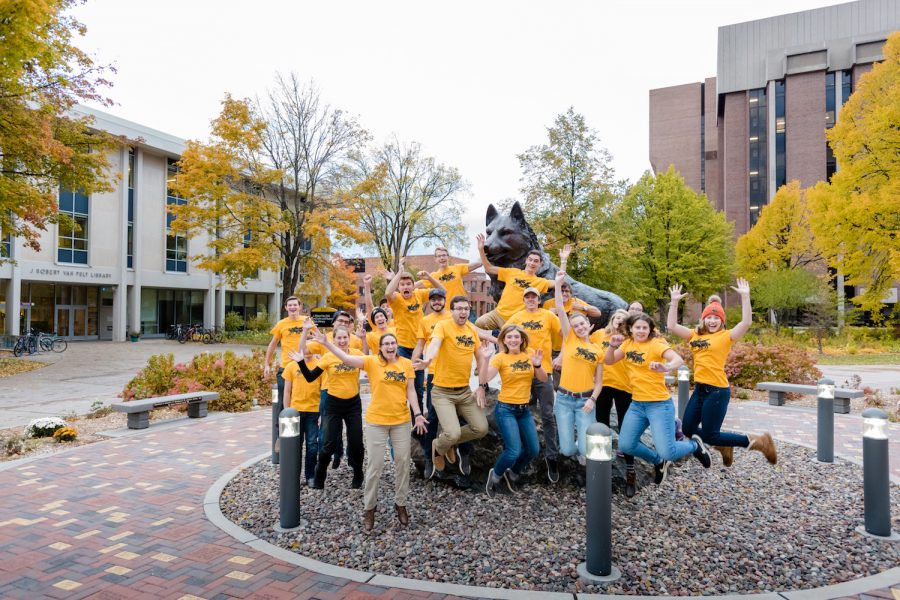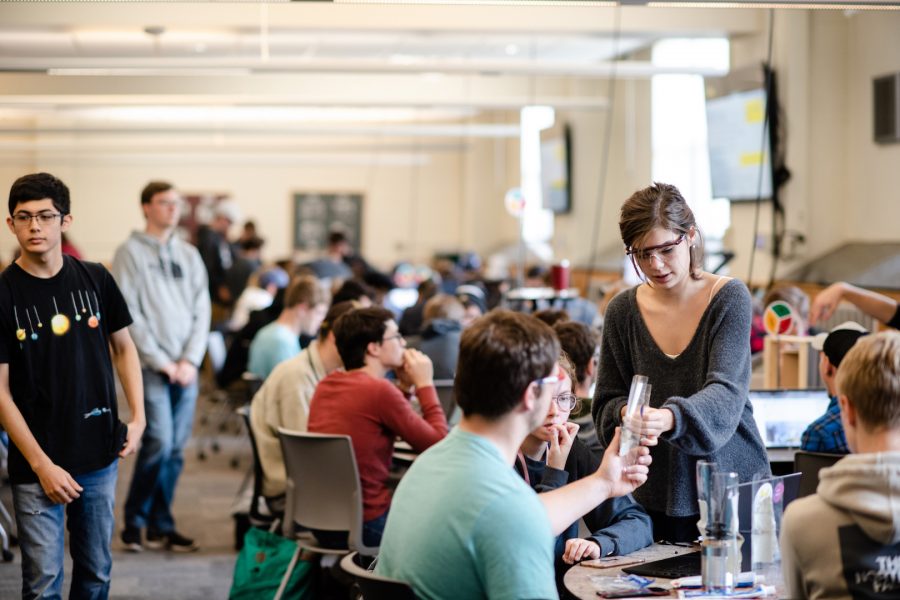
AJ Hamlin and Amber Kemppainen have been recognized for their leadership in designing LEAP, a highly successful, best practice program for first-year engineering students at Michigan Tech.
by Michael R. Meyer, Director, William G. Jackson CTL
LEarning with Academic Partners (LEAP) co-directors AJ Hamlin and Amber Kemppainen have been selected by College of Engineering Dean Janet Callahan for the Spring 2020 Deans’ Teaching Showcase. Both are Principal Lecturers in the Department of Engineering Fundamentals (EF) and alumnae of Michigan Tech.
Both are broadly versed in methods and implementations for active learning and have practiced active learning methods in their classrooms for nearly two decades.
In 2015, EF started considering an approach to first-year engineering that would be effective and scalable. The selected approach used flipped content delivery in a studio environment in which students would have ready access to near-peer mentoring. As soon as the mentoring component was included, Hamlin and Kemppainen stepped up as the two co-directors of the program. Working collaboratively, they learned the principles and implementations of two existing approaches: Supplemental Instruction (SI) (usually associated with the University of Missouri, Kansas City) and Learning Assistants (LA) (usually associated with the University of Colorado). From study and attending on-site workshops and conferences, the two developed a composite approach to near-peer mentoring that became the LEAP program.
In general, SI does not include a mandatory session for students. By contrast, the model pioneered by AJ and Amber did include a mandatory LEAP session between the near-peer leader and a group of not more than 24 students to augment instruction in the EF first-year engineering courses. This was a significant departure that proved very beneficial; first-year students often do not see value in a situation that augments what they do in “regular class.” In effect, the innovation by the LEAP CoDirectors made the LEAP lab section meeting a “regular class meeting.” Once LEAP was experienced by the students over time, they appreciated the nearness of a near-peer to help them.

Hamlin and Kemppainen also adapted the LA model, embedding LEAP Leaders as mentors for the work to be done in the larger flipped classrooms of the first-year engineering courses. The EF major classrooms are in Wadsworth Hall (capacity of 5 LEAP sections, or 120 students) and in Dillman Hall (capacity of 3 LEAP sections, or 72 students).
Dean Callahan’s nomination emphasizes this insight and innovation at Michigan Tech. “Using near-peer mentors is a best practice in teaching—AJ and Amber’s work as co-directors of the LEAP program has been an outstanding demonstration of how to engage students with their learning,” says Callahan.
The LEAP Leader training program was designed almost from scratch by Hamlin and Kemppainen. The training prepares the LEAP Leaders to be learner-centered, but to emphasize that the weight of learning is always the student’s. The LEAP Leader is taught how to mentor students, and the training emphasizes practical learning concepts such as effective scaffolding for a student. It also gives them opportunities to practice the needed pedagogical techniques.
After the rollout of the revised first-year engineering program in Fall, 2017, it became clear that the LEAP leader training and experience was highly educational for those near-peer leaders as well. With that realization, Amber and AJ embarked on developing and teaching leadership courses under the Pavlis Honors College heading. Three courses are now offered: a 2000 level course that Amber and AJ developed and teach collaboratively, and 3000 and 4000 level courses that were designed and taught by Amber. The three courses taken together form the required set of courses in the Leadership Minor, which is offered through Pavlis.
Hamlin and Kemppainen have recognized the power that near-peer mentoring has to engage first-year students in their own education. They designed and implemented a program that is now seen as essential for first-year engineering students.
Jon Sticklen, chair of the Department of Engineering Fundamentals summarizes: “AJ and Amber have definitely gone above and beyond in their positions as CoDirectors of our LEAP Program. LEAP has become the cornerstone of the First-Year Engineering Program, largely because the undergraduate students who are our LEAP Leaders are well trained and genuinely connected to their first-year engineering students. LEAP works because of the leadership and content training, as orchestrated by Amber and AJ.”
Dean Callahan confirms their exceptional impact, both for the first year students and the LEAP leaders. “Michigan Tech can rightly be proud of the work of AJ Hamlin and Amber Kemppainen. As CoDirectors of the LEarning with Academic Partners program, they have shown a true engineering viewpoint in addressing the needs of first-year students: to have a good role model, an effective mentor, and a learning coach—all rolled into one sophomore student to whom they can relate. They had the vision as a goal, they sought out how existing near-peer mentoring programs addressed the issues, and they developed a near-peer mentoring program that is a critical part of what makes of first-year engineering program ‘tick’. I am very proud of Hamlin’s and Kemppainenm’s work in support of our students.”
AJ Hamlin’s experience in teaching first-year engineering students dates from 2001. In this time, she has done research in and developed an assessment of spatial visualization skills and measured the effectiveness of inverted and blended courses. Among other awards, Hamlin won the 2010 Editor’s Award from the Engineering Design Graphics Journal, and in April 2015 the Michigan Tech Canvas Creative Course Contest (C4). She has served in various offices of the ASEE Multidisciplinary Division, including Secretary/Treasurer, Program Chair, and currently the Division Chair.
Amber Kemppainen, who began teaching in 2005, is now in the final phases of completing a PhD in applied cognitive science and human factors (ACSHF). Through her work for her degrees in the learning sciences, Kemppainen has been supported in part by a King-Chavez-Parks Future Faculty Fellowship (a State of Michigan program). Her areas of research have included qualitative and quantitative analysis and assessment skills in educational settings, and development, deployment, and assessment of online training programs. She won a C4 award in 2015.
Hamlin and Kemppainen will be recognized at an end-of-term luncheon with other showcase members, and, as a team, are candidates for the CTL Instructional Award Series (to be determined this summer) recognizing introductory or large-class teaching, innovative or outside the classroom teaching methods, or work in curriculum and assessment.
Learn more about Michigan Tech’s LEAP program here.